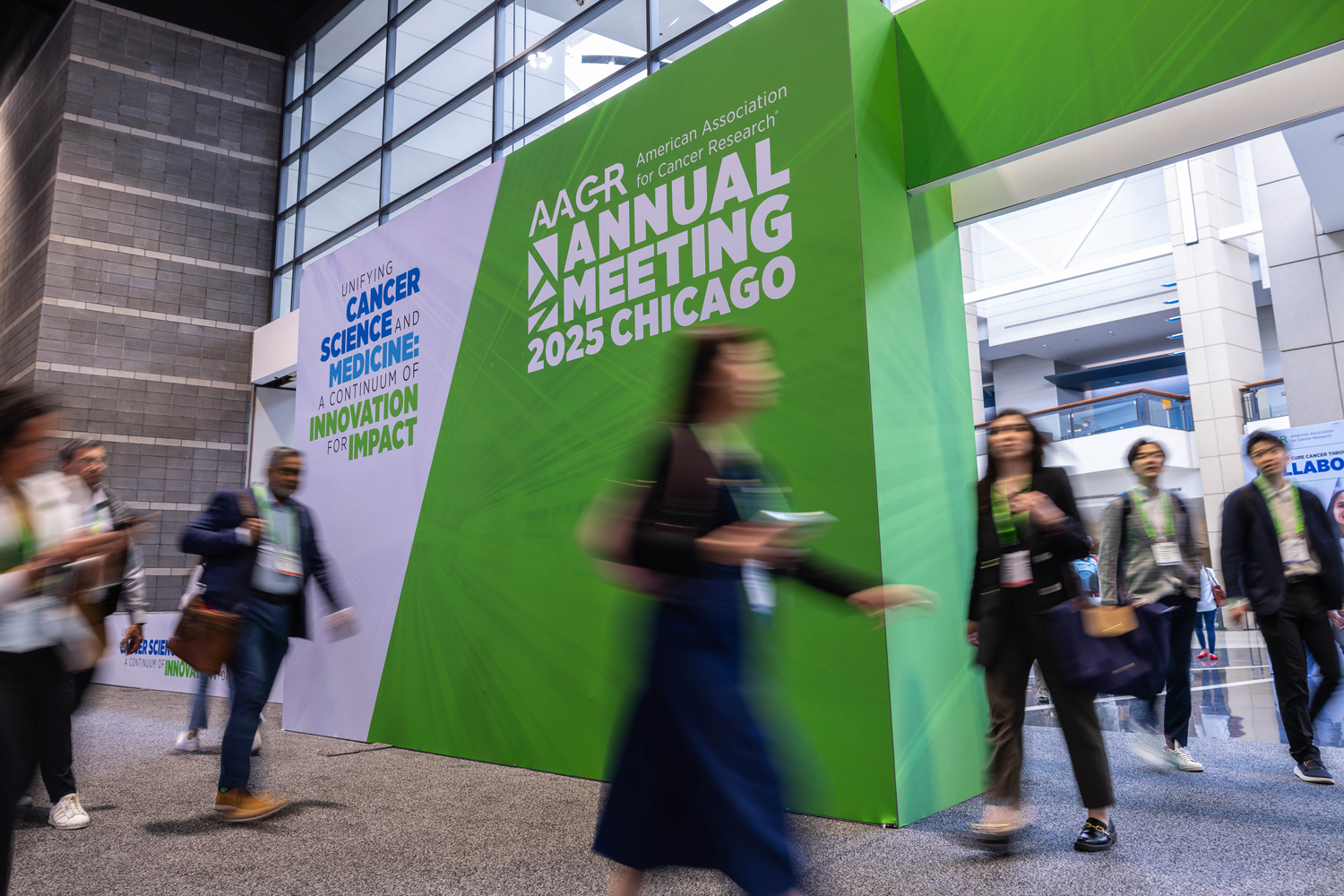MAJOR MEDICAL MEETINGS and conferences, such as the American Association for Cancer Research (AACR) Annual Meeting 2025, held April 25 to 30 in Chicago, are a chance to share and discuss the latest research in cancer prevention, detection, treatment and posttreatment care. Cancer Today was there to provide timely reports on the findings and discussions that may affect patients, survivors and their families. Catch up with our reporting and stay tuned for continued coverage in the weeks ahead. (The AACR publishes Cancer Today.)
Alleviating Skin Side Effects in Colorectal Cancer

Photo by SeventyFour / iStock / Getty Images Plus
Targeted therapies for cancers that overexpress the EGFR protein can cause acneiform rash, resulting in acne-like bumps and often itching, pain or even infections. The side effect may be responsible for people having their dose lowered or stopping EGFR-targeted treatment altogether. “Safe and efficacious management of acneiform eruption is one of our greatest unmet needs,” Anisha B. Patel, a dermatologist at the University of Texas MD Anderson Cancer Center in Houston, told Cancer Today.
People given a medicated gel to manage the condition reported a decrease in acneiform rash severity and improved skin-specific quality of life in a phase II study by Patel and colleagues.
Controlling Cancer Without Surgery
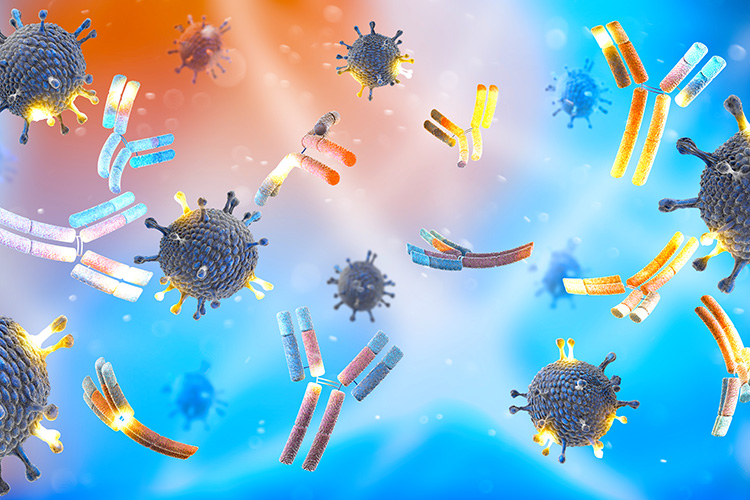
Image by Naeblys / iStock / Getty Images Plus
Treatment with immunotherapy may allow some people with early-stage cancer to avoid surgery. A phase II clinical trial gave people with cancers of various types that have mismatch-repair deficiency (dMMR) an immune checkpoint inhibitor (ICI), a type of immunotherapy. Results found all 49 people with rectal cancer who received an ICI had a complete response, and 92% had no evidence of disease two years later. The complete response rate across other cancer types was 65% but varied by diagnosis.
“The ability to spare patients the need to undergo potentially morbid surgery and other therapies is pretty remarkable,” said Ryan B. Corcoran, director of the Tucker Gosnell Center for Gastrointestinal Cancers at Mass General Cancer Center in Boston who was not involved with the study.
Federal Support for Cancer Research Takes the Stage at AACR Annual Meeting
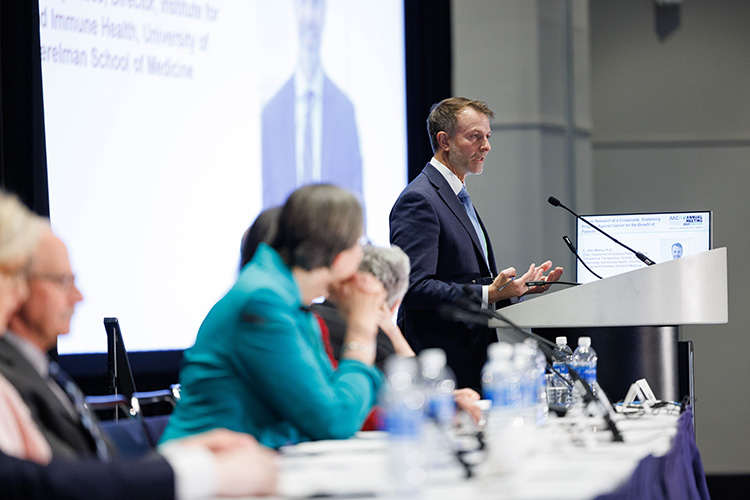
E. John Wherry, an immunologist at the University of Pennsylvania in Philadelphia, addresses the audience during “Cancer Research at a Crossroads: Sustaining Progress Against Cancer for the Benefit of Patients,” at the American Association for Cancer Research (AACR) Annual Meeting 2025 in Chicago. Photo by © AACR/Scott Morgan
Amid news of layoffs at the National Institutes of Health (NIH) and halts in funding, scientists gathered at the AACR Annual Meeting 2025 to discuss the importance of federal support for cancer research. The panel discussion, titled “Cancer Research at a Crossroads: Sustaining Progress Against Cancer for the Benefit of Patients,” included researchers, former directors from the NIH and the National Cancer Institute, a patient who have benefited from the development of new treatments, and Patricia M. LoRusso, the outgoing president of the AACR.
“When science is silenced, patients pay the price,” LoRusso said. “Behind every delay, every cancellation and every missed opportunity is someone whose life might depend on what we discover next.”
Immunotherapy Improves Results in Head and Neck Cancer
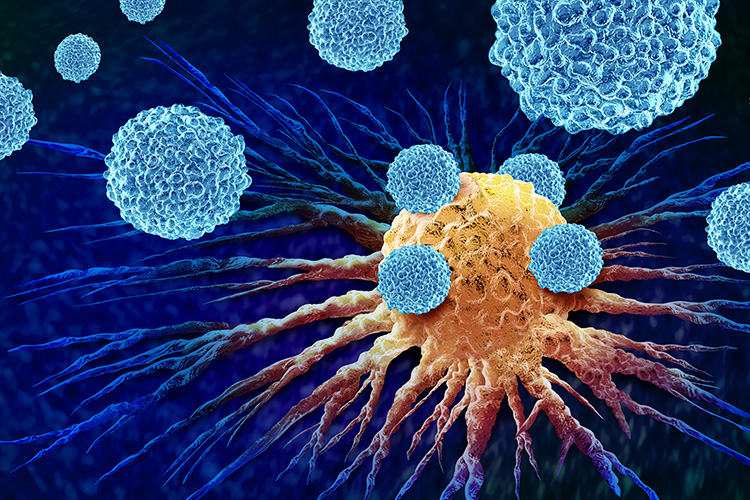
Image by wildpixel / iStock / Getty Images Plus
A phase III trial found that adding the immune checkpoint inhibitor Keytruda (pembrolizumab) to treatment for locally advanced head and neck cancers can extend survival by two years compared with standard therapy alone. “We’ve waited for 20 years for something like this in head and neck cancer,” said Ravindra Uppaluri, the study’s lead author and director of head and neck surgical oncology at Dana-Farber Cancer Institute in Boston.
Uppaluri said researchers will continue to monitor patient outcomes to see if the approach improves overall survival. And because this study examined using Keytruda before and after surgery, he said future studies should look separately into using it before surgery and after surgery.
Missed Activities Due to Cancer-related Fatigue and Depression

Photo by Tero Vesalainen / iStock / Getty Images Plus
“What is the most common complaint you hear from patients?” Simo Du, a resident physician at NYC Health + Hospitals/Jacobi in New York City, asked at the AACR Annual Meeting 2025. Du presented a study on the ways that cancer-related fatigue, the complaint Du most commonly gets from patients, and depression affect people’s ability to continue recreational activities and work.
The study found that women were 54% more likely to report fatigue and 32% more likely to report depression than men. Both conditions were linked to withdrawing from recreational activities. Physical activity could help protect against both depression and fatigue, according to the study, but Du stressed the importance of individualized therapies, as cancer patients may have other cancer-related effects that make them more susceptible to injury or infection.
Declining Breast Cancer Mortality in Younger Women

Photo by andrei_r / iStock / Getty Images Plus
Using breast cancer data from the National Cancer Institute, researchers found that breast cancer death rates declined for younger women in the U.S. between 2010 and 2020. The study found incidence-based mortality for breast cancer in women ages 20 to 49 went from a 2010 rate of 9.7 per 100,000 women to 1.47 per 100,000 in 2020. “We have made tremendous advances in reducing mortality from breast cancer in young women but there are still opportunities for improvements, especially in relation to eliminating disparities,” said Adetunji Toriola, a surgeon at Siteman Cancer Center at Washington University School of Medicine in St. Louis and an author on the study, in a press release.
The study explored trends according to race, age and molecular features of the tumor. One surprising result was the low survival of women under 40 with luminal A breast cancer, which is normally considered a less aggressive subtype of the disease, relative to luminal B and HER2-enriched cancers. Toriola said the finding, if confirmed in other studies, may represent greater biological diversity in luminal A cancer than previously thought.
Cancer Vaccines Show Promise in Early Trials

Photo by Chinnapong / iStock / Getty Images Plus
Researchers discussed two promising approaches to preventing disease recurrence by using cancer vaccines in presentations at the AACR Annual Meeting 2025. In one study, researchers used an mRNA vaccine for pancreatic cancer developed according to the unique features of each participant’s cancer to train the immune system to attack cancer cells when they arise. With three years of follow-up, they found lasting responses and the continued presence of T cells with the ability to target cancer. Another study looked at peptide vaccines, which do not need to be personalized, allowing for off-the-shelf treatments that can be used in patients once they are found to be eligible. The results of early studies showed 84% of participants with pancreatic or colorectal cancer with certain mutations had an immune response.
Darrell J. Irvine, an immunology and microbiology researcher at Scripps Research in San Diego, said the discovery of new targets and technologies in treatment has driven hope for preventing recurrences. “These features, along with new clinical trial designs, are really coming together and making for exciting progress in cancer vaccines,” he said.
Tissue and Liquid Biopsies for Targeted Therapy
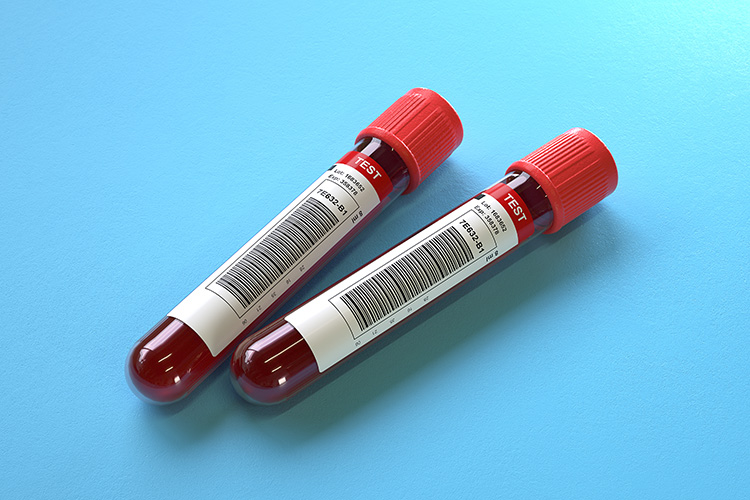
Photo by Andy / iStock / Getty Images Plus
The ROME study looked at the use of tissue and liquid biopsies to guide treatment using molecular features of the tumors in advanced cancers. Using targeted treatment led to longer progression-free survival than standard care both in cases where the target was found in liquid biopsy alone and in cases where it was found in tissue biopsy alone, but cancers in which treatment was determined by a target found in both tests had the greatest improvement in survival.
People with concordant results, meaning both tests found the same biomarker, went 4.93 months without cancer progressing when given targeted therapy compared with 2.8 months for people given standard treatment. “The concordance may be related to the tumor expressing the same genomic alteration in different metastatic sites,” said Paolo Marchetti, scientific director at the Istituto Dermopatico dell’Immacolata in Rome, who presented the results.
Researchers Tackle Immune-related Adverse Effects

Image by greenbutterfly / iStock / Getty Images Plus
Immune checkpoint inhibitors (ICIs) are an important tool in cancer care, but about 40% of people treated with them will experience immune-related adverse events (irAEs). A session at the AACR Annual Meeting 2025 explored some of most common and challenging irAEs in order to allow more people to use the treatments through better understanding and management of these effects. “The reason we care so deeply about all of these adverse events is really the breadth of efficacy that we have seen with immune checkpoint inhibitors over the years,” said Elad Sharon, a medical oncologist at Dana-Farber Cancer Institute in Boston.
The variety of potential effects could be a hindrance to managing them in patients. For example, breathing difficulties could be caused by pneumonitis brought on by an ICI or it could be an infection. Understanding the likely effects of the particular treatment and working with teams that include multiple specialties can help effectively diagnose and manage any effects.
Redefining Cancer Survivorship

Photo by Jacob Wackerhausen / iStock / Getty Images Plus
Survivorship research has typically focused on people who have finished treatment, but with new treatments extending the lives of people with advanced and metastatic cancer, there is a growing interest in addressing the long-term needs of patients who will never complete treatment. Survivorship care for people with advanced cancer was the subject of a panel discussion at the AACR Annual Meeting 2025 featuring researchers, patient advocates and a recorded presentation from Michelle Mollica, deputy director of the Office of Cancer Survivorship at the National Cancer Institute.
Panelists spoke about the unique challenges for people with advanced cancer, from accepting uncertainty around the prognosis to dealing with side effects indefinitely. “Living longer doesn’t automatically equate to living better,” said Jill Feldman, a member of the panel who is living with stage IV lung cancer.
Cancer Today magazine is free to cancer patients, survivors and caregivers who live in the U.S. Subscribe here to receive four issues per year.

